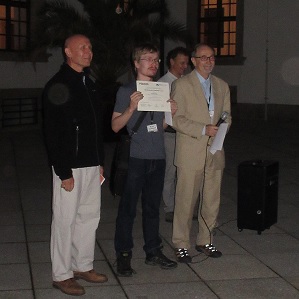BayesFusion’s interactive model repository at repo.bayesfusion.com offers a collection of example models for our users. We encourage our users to contribute to the user community by making their models available. In case of models described in publications, it is a great way of advertising your work. An on-screen comment that lists the correct reference to the paper in which the model appeared should increase your citation count. Please contact us in case you want to contribute your model to the repository.
Business-related news
This is a 14-hour course covering the principles of probabilistic modeling using Bayesian networks, building Bayesian networks based on expert knowledge (both structure and numerical parameters), dynamic Bayesian networks, learning Bayesian networks from data and causal discovery, parameter learning, validation techniques, elements of expected utility theory, utility elicitation, and influence diagrams.
Meeting times:
The course will take place through on-line meetings (Zoom).
9:00am-11:10am Eastern Time (6:00am-8:10am Pacific Time, 3:00pm-5:10pm Central European Time)
Monday, February 1, 2021
Tuesday, February 2, 2021
Wednesday, February 3, 2021
Thursday, February 4, 2021
Monday, February 8, 2021
Tuesday, February 9, 2021
Wednesday, February 10, 2021
Pre-requisites:
Elementary college-level math and computer skills, basic data processing skills through tools such as Excel. No special prerequisites or knowledge of elements of decision-theoretic modeling or tools such as Bayesian networks. We will cover all that is required in the course. While all concepts covered in the course are general, we will use GeNIe to illustrate them. Tuition covers a 30-day GeNIe license for use during the course.
Tuition fee:
Course tuition fee $500 ($300 for students)
There is a minimum of 5 and a maximum of 20 participants.
For more information/to register:
Contact training@bayesfusion.com
This is a 12-hour course covering the principles of probabilistic modeling using Bayesian networks, building Bayesian networks based on expert knowledge (both structure and numerical parameters), dynamic Bayesian networks, learning Bayesian networks from data and causal discovery, parameter learning, validation techniques, elements of expected utility theory, utility elicitation, and influence diagrams.
Meeting times:
The course will take place through on-line meetings (Zoom).
1:00pm-3:10pm Eastern Time (10am-12:10pm Pacific Time)
Thursday, November 5, 2020
Friday, November 6, 2020
Monday, November 9, 2020
Tuesday, November 10, 2020
Thursday, November 12, 2020
Friday, November 13, 2020
Pre-requisites:
Elementary college-level math and computer skills, basic data processing skills through tools such as Excel. No special prerequisites or knowledge of elements of decision-theoretic modeling or tools such as Bayesian networks. We will cover all that is required in the course. While all concepts covered in the course are general, we will use GeNIe to illustrate them. Tuition covers a 30-day GeNIe license for use during the course.
Tuition fee:
Course tuition fee $500 ($300 for students)
There is a minimum of 5 and a maximum of 20 participants.
For more information/to register:
Contact training@bayesfusion.com
The Program Committee of the 9th Probabilistic Graphical Models (PGM-2018) conference announced the winners of the BayesFusion Best Student Paper Award during the PGM-2018 conference banquet in Prague, Czech Republic, on September 13. The winners are:
BayesFusion Best Student Paper Award given jointly to:
Irene Córdoba, Department of Artificial Intelligence Universidad Politécnica de Madrid, Spain, for the paper entitled A Partial Orthogonalization Method for Simulating Covariance and Concentration Graph Matrices, co-authored with Gherardo Varando, Concha Bielza and Pedro Larrañaga
Kari Rantanen, HIIT, Department of Computer Science, University of Helsinki, Finland, for the paper entitled Learning Optimal Causal Graphs with Exact Search, co-authored with Antti Hyttinen and Matti Järvisalo
Honorable Mentions:
Gherardo Varando, Department of Artificial Intelligence Universidad Politécnica de Madrid, Spain, and Department of Mathematical Sciences, University of Copenhagen, Denmark, for being a student co-author of the paper that won the BayesFusion Best Student Paper Award, entitled A Partial Orthogonalization Method for Simulating Covariance and Concentration Graph Matrices, with Irene Córdoba, Concha Bielza and Pedro Larrañaga
Janne Leppä-aho, University of Helsinki, Department of Computer Science / HIIT, Finland, for the paper entitled Learning Non-parametric Markov Networks with Mutual Information, co-authored with Santeri Räisänen, Xiao Yang and Teemu Roos
BayesFusion releases an interactive model repository that allows users to open models and work with them using any web browser. The user can set evidence (or a decision in influence diagrams) and observe the impact of this observation on the rest of the model. Models in the repository are divided into small Bayesian networks, large Bayesian networks, hybrid Bayesian networks, and influence diagrams. Each of the repository models can be downloaded in order to be used locally through GeNIe.
BayesFusion, LLC, has joined the Ecosystem Management Decision Support (EMDS) development group, also known as the EMDS Consortium. The EMDS system is an application development framework for knowledge-based decision support of ecological analysis and planning at any geographic scale. EMDS integrates state-of-the-art geographic information system (GIS) as well as logic programming and decision modeling technologies on multiple platforms (Windows, Linux, Mac OS X) to provide decision support for a substantial portion of the adaptive management process of ecosystem management. More information about the EMDS system can be found at the following location and the following Wikipedia article.
BayesFusion, LLC, has acquired an exclusive license for the decision modeling software GeNIe and SMILE from the University of Pittsburgh. The software was developed by the Decision Systems Laboratory between the years of 1994 and 2015. Members of BayesFusion, LLC, team, Marek Druzdzel and Tomek Sowinski, were directly involved in the development of the software.
BayesFusion, LLC, has been formally registered with the State of Pennsylvania today.







